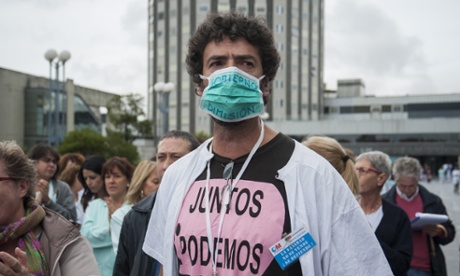
Spain’s foreign affairs minister has defended the government’s decision to repatriate two Spanish nationals with Ebola, despite a nurse who treated them becoming the first person to contract the virus outside of west Africa.
“The government did what it had to do,” José Manuel García-Margallo told El País newspaper. “The duty of a state is to protect its citizens – and even more so when they are in difficult circumstances far from Spain. All the developed countries who have had this problem have done the same.”
The two missionaries, Miguel Pajares, 75, and Manuel García Viejo, 69, died in August and September, days after being evacuated to Madrid for treatment. Spanish nurse Teresa Romero Ramos tested positive for the Ebola virus shortly after. She remains in a stable but serious condition.
García-Margallo argued that far from hurting Spain’s image, the Ebola case would show the world the strength of the Spanish healthcare system. “In the face of an event that can happen in any country, Spanish society has demonstrated its solidarity, and in the long run we will see that our healthcare system is among the world’s best.”
On Sunday, Fernando Simón, of Spain’s health ministry, said the presence of the virus in Romero Ramos’s blood appeared to be diminishing. “We have high hopes that the infection is under control,” he said. Fifteen others remain in quarantine in Madrid’s Carlos III hospital, including the nurse’s husband and several health workers who treated her before she tested positive for Ebola. None of them have shown symptoms of the virus.
Last week, in a phone interview from her hospital bed, Romero Ramos told El País that she might have touched her face with her gloves while removing her protective suit. She later told the Spanish broadcaster Cuatro that she had been given “little training” on how to put on and take off the suit.
Complaints of scant training by health workers has led Madrid’s top prosecutor to launch an investigation. The matter was brought before court by workers’ unions, who argue that the Spanish health authorities violated labour laws by failing to provide adequate protection and training for its employees.
Amelia Batanero, a nurse who underwent training to treat Ebola patients at the Carlos III, told the Guardian: “We haven’t learned how to use these suits, we don’t know the protocol on how to treat Ebola.”
The news that a healthcare worker in Dallas has also contracted the Ebola virus prompted comparisons on Monday between the differing response in each country to the infected health workers.
Despite the fact this was the US authorities’ second case of Ebola – after the death of Thomas Eric Duncan in Dallas this month – and had been riddled with missteps, the Spanish media used the news to take aim at their government’s slow response.
Romero Ramos contacted health authorities several times over the course of nearly a week before she was tested for Ebola, while the unnamed US healthcare worker was put in quarantine less than 90 minutes after she arrived at a hospital complaining of a slight fever.
Many of Romero Ramos’s neighbours learned of the diagnosis through the media, in contrast to the US where authorities contacted the patient’s neighbours to explain the situation. And while a global protest failed to prevent health authorities in Spain from putting down Romero Ramos’s dog, Excálibur, US authorities facing a similar situation have promise to save the healthcare worker’s dog.
